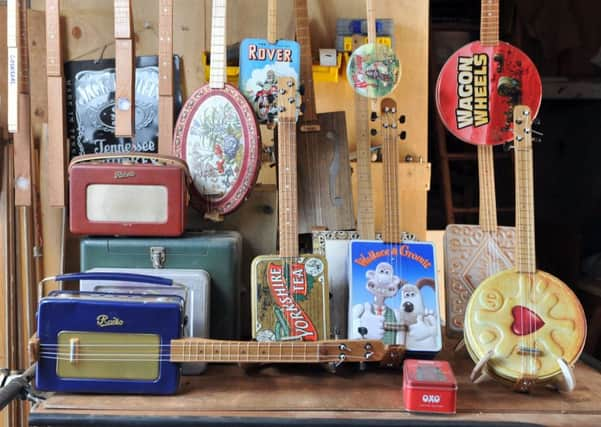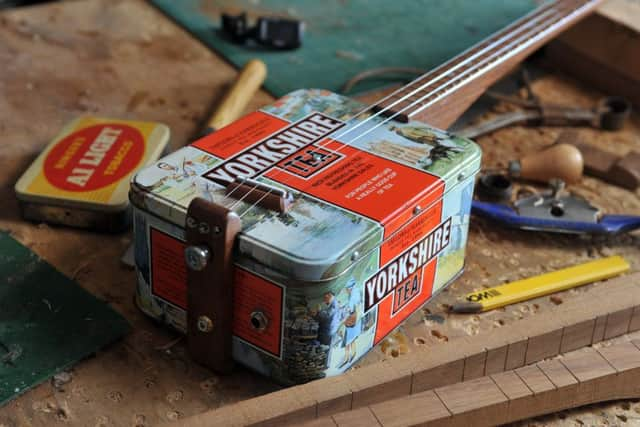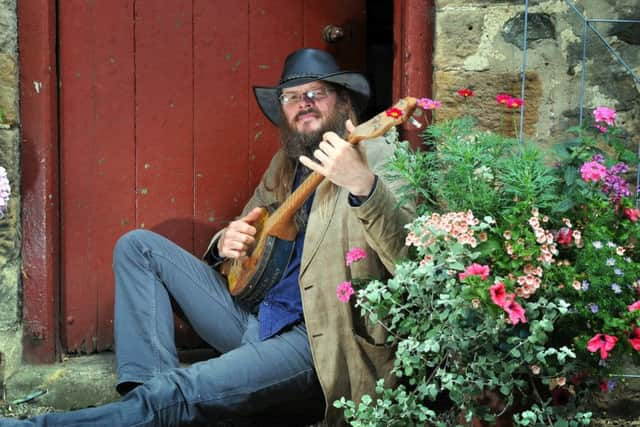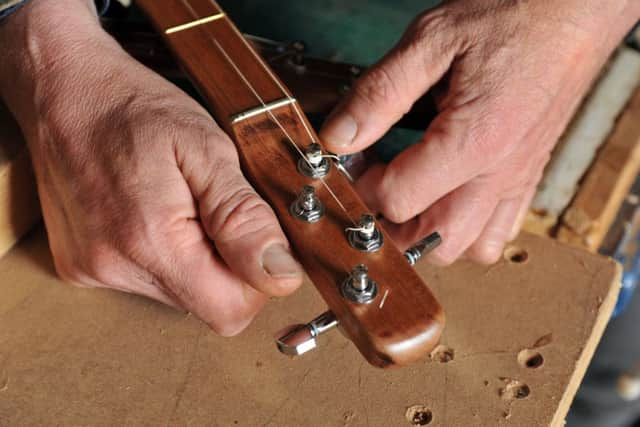Man with a twang


He isn’t a fan of Donald Trump, far from it, but the controversial US President seems to have unwittingly boosted Robyn Greig-Brown’s business. Soon after Trump was elected, sales to America of Robyn’s handcrafted canjos, ukuleles and cigar box guitars began to climb. Maybe it’s because the stringed instruments made from upcycled tins and boxes have their roots in the blues and Americans have never felt more like singing them.
Robyn doesn’t know. “I’ve sold a lot of custard cream and jammy dodger tin ukuleles to Texas and there’s a definite correlation with Donald Trump, but why is still a mystery,” he says.
Advertisement
Hide AdAdvertisement
Hide AdIt could be that those who are depressed by The Donald are looking for a happy distraction and that’s just what Spatchcock and Wurzill offers. The name of Robyn’s enterprise, based at his cottage near Bedale, is made up but perfectly encapsulates what it is, an ingenious one-man band who taught himself to play and then to make instruments.


He started with a single string canjo and then progressed to “ukes” and tin and box guitars. They can be acoustic but are designed to be plugged into a guitar amp or, better still, a Spatchcock vintage amp. Robyn makes them from broken Roberts radios and says they sound more crackly and authentic.
He makes the instruments from recycled materials, just like the original blues musicians in the Mississippi Delta did. The necks are hand-carved from furniture destined for the tip while the frets are old nails and the bodies are made from tins or boxes.
A “tin fanatic”, he already had a big collection and hunts down more from car boot sales. The deeper the tin, the more bass there is and round tins amplify the sound. Wooden boxes are more mellow, according to Doncaster-born Robyn, who had already taught himself to play the banjo when he made his first canjo 10 years ago.
Advertisement
Hide AdAdvertisement
Hide Ad“I saw someone playing one when I was working on a cattle ranch in Nebraska in 1989 and it stayed in my head. I had lots of tins so I made a canjo and it was rubbish, so I made a few more until I got it right. I ended up with 30 of them and my wife said: ‘You’ll have to do something with them,’ so I had a stall at a local music festival and it went so well I started making them to sell.”


The smallest and cheapest is a one-string canjo made from a tiny, one-ounce tobacco tin, although they can be made from any size of tin or box and start at £35. It is based on the diddley bow and is thought to originate from Africa.
One of the most notable diddley bow players was Delta blues man Lonnie Pitchford, whose gravestone has a playable diddley bow on the side, but it was Seasick Steve who helped bring it into mainstream, modern-day consciousness.
“Seasick Steve has done me a lot of favours. It means I don’t have to do a lot of explaining,” says Robyn, who adds that the diddley bow/canjo is the easiest instrument in the world to play and presents me with the challenge.
Advertisement
Hide AdAdvertisement
Hide AdWith a play-by-numbers system using the frets, a novice can play a recognisable tune in 60 seconds. I manage to twang a version of London Bridge within ten minutes and I’m hooked. It feels good and then Robyn shows me what I could progress to as he plays Camptown Races. I am convinced that what the world needs now is more diddley bows, canjos and ukeleles and I’m not the only one.


What started as a hobby is now almost a full-time job thanks to increasing demand, which has almost overtaken Robyn’s career in horticulture. He now spends most of his time in his workshop listening to Radio 4 and making instruments. “It’s really taken off and I also get a lot of commissions from people who send me their own tins,” says Robyn, who sells through his website, fairs and music festivals.
He has had quite a few famous customers but generally doesn’t recognise them. “I showed one guy at Glastonbury how to play London Bridge and he had the good grace not to tell me who he was. It turned it out he was Serge from Kasabian.”
Most buyers also display their purchases as they look great hung on a wall, which is why Robyn likes to call them “upcycled interactive artwork”.
Advertisement
Hide AdAdvertisement
Hide AdBest-sellers include the Jack Daniels, Wallace and Gromit, and old Oxo tins, along with Robyn’s favourite, the rectangular Yorkshire Tea tin. Eagle-eyed viewers may have spotted a Spatchcock and Wurzill canjo being played on a recent Yorkshire Tea TV advert. “The only problem is that they’ve redesigned them as tea caddies and they don’t work very well, for me,” he says.


It’s perhaps just as well as he may struggle to cope with an influx. Robyn and his wife, Nicola, have a lovely and largely alternative lifestyle. His hobbies include banjo playing, Appalachian dancing and listening to death metal. He isn’t chasing riches.
“I like trying new things, I’ve got a commission for a cigar box fiddle and I’ve just bought myself an ice cream tricycle so I might make a mobile stall,” he says. “I don’t want to expand. There would be no joy in a production line.”
spatchcockandwurzill.com